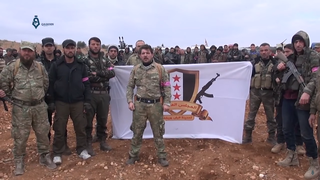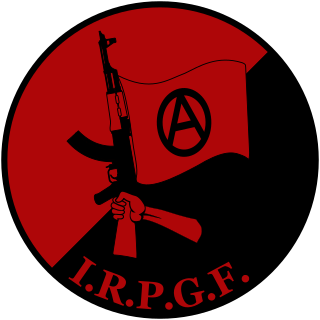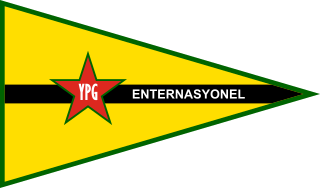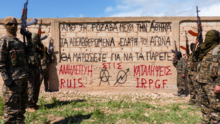
The People's Defense Units (YPG), also called People's Protection Units, is a mainly Kurdish militant group in Syria and the primary component of the Syrian Democratic Forces (SDF). YPG provides updates about its activities through YPG Press Office Telegram channel and social media accounts.

The Autonomous Administration of North and East Syria (AANES), also known as Rojava, is a de facto autonomous region in northeastern Syria. It consists of self-governing sub-regions in the areas of Afrin, Jazira, Euphrates, Raqqa, Tabqa, Manbij, and Deir Ez-Zor. The region gained its de facto autonomy in 2012 in the context of the ongoing Rojava conflict and the wider Syrian civil war, in which its official military force, the Syrian Democratic Forces (SDF), has taken part.

The Syriac Military Council is an Assyrian/Syriac military organisation in Syria, part of the Syrian Democratic Forces. The establishment of the organisation was announced on 8 January 2013. According to the Syriac Military Council, the goal of the organisation is to stand up for the national rights of and to protect Assyrians in Syria. It operates mostly in the densely populated Assyrian areas of Al-Hasakah Governorate, and is affiliated to the Syriac Union Party.

The Rojava–Islamist conflict, a major theater in the Syrian civil war, started after fighting erupted between the Kurdish People's Protection Units (YPG) and Islamist rebel factions in the city of Ras al-Ayn. Kurdish forces launched a campaign in an attempt to take control of the Islamist-controlled areas in the governorate of al-Hasakah and some parts of Raqqa and Aleppo governorates after al-Qaeda in Syria used those areas to attack the YPG. The Kurdish groups and their allies' goal was also to capture Kurdish areas from the Arab Islamist rebels and strengthen the autonomy of the region of Rojava. The Syrian Democratic Forces would go on to take substantial territory from Islamist groups, in particular the Islamic State (IS), provoking Turkish involvement in the Syrian Civil War.

Euphrates Region, formerly Kobanî Canton, is the central of three original regions of the Autonomous Administration of North and East Syria, comprising Ayn al-Arab District of the Aleppo Governorate, Tell Abyad District of the Raqqa Governorate, and the westernmost tip of the Ras al-Ayn Subdistrict of the Ras al-Ayn District of Al-Hasakah Governorate. Euphrates Region unilaterally declared autonomy in January 2014 and since de facto is under direct democratic government in line with the polyethnic Constitution of Rojava.

The siege of Kobanî was launched by the Islamic State of Iraq and the Levant on 13 September 2014, in order to capture the Kobanî Canton and its main city of Kobanî in northern Syria, in the de facto autonomous region of Rojava.

Turkey's involvement in the Syrian Civil War began diplomatically and later escalated militarily. Initially, Turkey condemned the Syrian government at the outbreak of civil unrest in Syria during the spring of 2011; the Turkish government's involvement gradually evolved into military assistance for the Free Syrian Army in July 2011, border clashes in 2012, and direct military interventions in 2016–17, in 2018, in 2019, 2020, and in 2022. The military operations have resulted in the Turkish occupation of northern Syria since August 2016.

The Women's Protection Units or Women's Defense Units is an all-female militia involved in the Syrian civil war. The YPJ is part of the Syrian Democratic Forces, the armed forces of Rojava, and is closely affiliated with the male-led YPG. While the YPJ is mainly made up of Kurds, it also includes women from other ethnic groups in Northern Syria.

The International Freedom Battalion, commonly abbreviated as IFB or EÖT, is a revolutionary socialist armed group consisting of leftist foreign fighters fighting for the People's Defense Units in the Syrian Civil War in support of the Rojava Revolution and against the Turkish Armed Forces, the Syrian National Army, and Islamic State. The formation of the IFB was announced in June 2015 in Ras al-Ayn. Inspiration for the group came from the International Brigades of the Spanish Civil War. The political ideologies of the fighters include anarchism, Marxism–Leninism, Hoxhaism, Maoism, and anarcho-communism.

AANES–Syria relations concern the military and political relations between the Ba'athist Syrian Arab Republic and the Autonomous Administration of North and East Syria (NES), a de facto autonomous multi-ethnic region in northern and eastern Syria. The Syrian government does not officially recognise the autonomy of the AANES, and advocates a centralist approach to the governance of Syria. The NES seeks the federalisation of Syria. For most of the Syrian civil war, there has been a non-aggression pact between the military of Syria and the Syrian Democratic Forces, with occasional confrontations and some cooperation against Islamist groups, in particular against the Turkish Armed Forces and the Turkish-backed Syrian National Army. While the two sides co-operated militarily under Russian supervision since 2019, with Syrian and Russian troops stationed along the Turkish border to prevent further advances, political negotiations have ended in failure. The Syrian government has no authority or institutions in North and East Syria outside of its two security boxes in Qamishli/Qamislo and Al-Hasakah/Heseke. The Autonomous Administration does not allow the Syrian Government to hold elections in areas under its control.

The Syrian Democratic Forces (SDF) is a coalition formed by ethnic militias and rebel groups, and serves as the official military wing of the Autonomous Administration of North and East Syria (AANES). The SDF is allied to and supplied by the United States–led CJTF–OIR international alliance. Founded in 10 October 2015, the SDF claims that its mission is fighting to create a secular, democratic and federalised Syria. The SDF is opposed by Turkey, who claims the group has direct links to the PKK, which it recognizes as a terrorist group.

The Rojava conflict, also known as the Rojava Revolution, is a political upheaval and military conflict taking place in northern Syria, known among Kurds as Western Kurdistan or Rojava.

The Battle of Tel Abyad was a raid by the Islamic State of Iraq and the Levant on the YPG-held town of Tell Abyad at the end of February 2016, during the Syrian Civil War.

Faisal Abdi Bilal Saadoun, widely known as Abu Leyla or Abu Layla, was a commander in both the Free Syrian Army and the Syrian Democratic Forces (SDF). He is regarded by many as a hero of the Rojava–Islamist conflict.

The Syrian Democratic Forces (SDF) has many military councils for local security and defense, each being accountable to the civil council of the area they operate in.

Rojda Felat is a Syrian Kurdish senior commander of the Women's Protection Units (YPJ) and Syrian Democratic Forces (SDF), who has fought in the Rojava conflict since it began in 2012, and has led several major campaigns against the Islamic State of Iraq and the Levant (ISIL). A revolutionary feminist, Felat's stated goal is to achieve social transformation in the Middle East through the YPJ, "liberating the Kurdish woman and the Syrian woman in general from the ties and control of traditional society, as well as liberating the entirety of Syria from terrorism and tyranny".

In course of the Raqqa campaign (2016–2017), an international coalition, primarily composed of the Syrian Democratic Forces and CJTF–OIR, captured the Raqqa Governorate from the Islamic State of Iraq and the Levant, which had declared Raqqa city the capital of its self-proclaimed caliphate.

The International Revolutionary People's Guerrilla Forces (IRPGF) was a collective of anarchist fighters from around the world. Its formation was announced on 31 March 2017. According to the group, their goals were to defend the social revolution in Rojava in northern Syria, and to spread anarchism. The group announced its dissolution on 24 September 2018.

The Northern Democratic Brigade is a Free Syrian Army unit that is closely allied to the Syrian Kurdish YPG and YPJ in Afrin Region since 2014. Led by Absi Taha, Alexander Khalil, and Alexander Alaa, it also joined the Syrian Democratic Forces (SDF) in November 2015. The initial members of the group originated from Jabal Zawiya in Idlib, and it has recruited Arabs from Idlib, Aleppo, and other cities in northern Syria since allying with the YPG. Since joining the SDF, the unit has begun to operate across much of northern and eastern Syria, participating in operations against anti-SDF Syrian opposition factions, the Islamic State of Iraq and the Levant, the Turkish Armed Forces, and the Syrian National Army.

The YPG International or People's Protection Units International is a military unit made up of foreign fighters in the Syrian Democratic Forces. It was created in December 2016 as the Antifascist International Tabûr (AIT) of the People's Protection Units (YPG). The unit is part of the Syrian Democratic Forces in the Syrian Civil War.





















